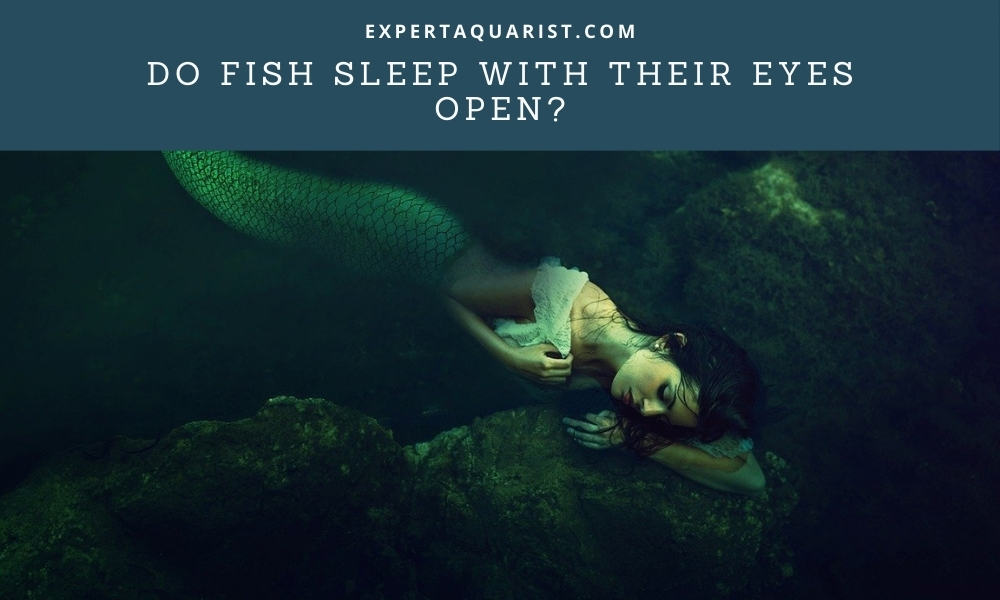A week ago, my niece came to my home with his momma. She was keen at watching my bettas right in the living room. She was so impressed with the bettas that he kept looking at them almost throughout the day.
And guess what?
After observing my fishes for three days, she asked me, “Doesn’t your fish sleep at all?” I was shocked and asked why did she think so? She replied with a bright smile that she hasn’t seen them sleeping despite noticing the fishes for three days. The fish had their eyes wide open anytime she looked at them.
I smiled back at her and said that fishes sleep, but their sleeping technique is different from us. When she went away, I entered the internet and went through people’s questions on the fishes.
At one point, my eyes got stuck on a question, “DO fish sleep with their eyes open?” I was actually surprised that several hundred people had asked the same thing.
So, here’s the short answer, fishes sleep, but they sleep with open eyes.
But how do they sleep then? Well, in today’s writing, we will discuss everything you need to know about how, when, and why fishes sleep with open eyes.
So… What Is sleep?
Well, before we get to see how fish sleeps and why their eyes remain open during sleeping time, you must understand what sleep means in reality.
In 1913, a French psychologist Henri Pieron defined sleep. The definition of sleep given by him is acceptable even now. It includes the following factors –
- All fishes have a specific posture for sleeping, which is a stereotype for a particular species. For instance, almost all mammals lay on the ground flat to sleep.
- The animal becomes physically inactive when it is sleeping. It won’t move much and won’t eat also. It also refers to a significant downing in metabolism and breathing rate. The entire process is referred to as behavioral quiescence.
- Some scientists believe that when an animal is sleeping, its awareness of what is happening around will become numb. They call it a stimulus for arousal threshold against elevation and movement. So, it defies that when an animal is sleeping, it won’t notice movements around it. Someone might walk past him, and it won’t sense it.
- Lastly, when an animal sleeps, it must reverse the reduced awareness and stimulus when it wants to wake up. If the animal can’t reverse the awareness stimulus anymore, it is considered clinically dead.

So….. Does Fish really Sleep?
Now that we understand what actually an animal needs to have to call that it is sleeping. But do these requirements met with the fish? Or, can we call a fish is sleeping when we consider the conditions mentioned above?
Let’s investigate it.
- The sleeping posture: Although you might not have noticed it, yes, a fish has a definite sleeping posture. Most fishes will lie on the tank bottom or rest their bod against a stone, rock, tree, or anything they get. Also, they remain motionless during sleeping time.
- Inactiveness or dormancy: When a fish sleeps, it doesn’t move, swim, eat, or hunt. It just remains as if it is hibernating.
- Unresponsive about the surrounding: When a fish sleeps, it remains entirely unaware of the surrounding. You can assure it by touching the fish slightly. It won’t react to your sensitive touches.
- Waking up: After a certain period, the fish wakes up and starts hunting, eating, and swimming like it was used before sleeping.
So, here’s we got the answer. Since fish meets all the requirements for sleeping according to the definition, we can call it, “Yes, fish sleeps. But their sleeping is different from us.”
Do Fish Sleep With Eyes Open?
The answer is pretty simple. Fish sleeps with their eyes open since they don’t have eyelids. As we all know, closing our eyes is performed with the eyelids.
However, some shark species at times close the eyes. But that’s not when they are sleeping. The sharks’ close eyes to protect the eyesight while eating so that it doesn’t get hurt with piercing teeth or fins of the other fishes.
You might consider sleeping with open eyes weird, but it serves a particular necessity too. When the eyes are open, fishes have a little awareness of what is happening around them. So, if a giant predator approaches a sleeping fish, the sunken eyes will notice it. And then help the fish wake up and fled away to save a life.
You can call that open eyes during sleep are the real difference between a dead fish and live fish.
How Fish Sleep in reality?
So, what makes a fish fall asleep? How does it effectively know when to sleep and when not to? To put it merely, fish’s sleeping sense is related to the daylight and night time consideration. Also, it depends on the active time and eyesight of the fish.
We all know that fishes can be both diurnal and nocturnal. Similarly, their sleeping cycle differs greatly. For instance, a diurnal fish will hunt and eat in the daylight. And when there’s no daylight, it becomes inactive and dormant. Also, their eyesight reduces considerably when the sun goes down. At this point, they take shelter in a cave, around stones or rocks. Also, they will hide inside the sand on the bottom of the water bodies. Some fishes even hid them in the substrate.
Finally, the diurnal fish will take a resting posture and, at one point, will fall asleep.
The nocturnal fishes become active when the sun goes down. As soon as the sun rises, likewise the diurnal fishes, these fish will hide and start resting. So, you can call them sleeping with an inactiveness when it is daytime.
You might be surprised to note that the actual reason for fish sleeping off depends on its body’s melatonin generation. The melatonin production and its impact on the nocturnal and diurnal fish work differently, which forces them to sleep.
Almost all mammals and vertebrates are equipped with the pineal gland. It is located right in the middle of the two hemispheres. Thereby, the pineal gland controls melatonin production. It stops producing melatonin when it senses any light.
And as soon as the light is off, the pineal gland boosts the melatonin growth rate. And it works differently in diurnal and nocturnal fish.
When melatonin starts its production, diurnal fish feels asleep. How surprising!
What’s more shocking is that for the nocturnal fish, it works just the opposite way. When a nocturnal fish sense a lack of melatonin due to daylight, it falls sleepy.

A decade ago, researchers wanted to find out the impact of the pineal gland in reality. So, they modified a zebrafish. It was incapable of producing any melatonin at all. So, it remained stressed throughout the day, not knowing when to hunt and when to rest. It had an incredibly short lifespan.
So, you know, sleep is essential. And for rest, melatonin production is significant, which allows the fish to know when to sleep and when not to in reality.
How Long Can A Fish Sleep In Reality?
We wanted to be Sherlock Holmes at this point and wanted to find the sleeping duration of the fishes. Luckily, we found research on the actual sleeping time of different animals, including fishes.
Scott S. Campbell and Irene Tobler researched 168 species of different animals. Unfortunately, they found that monitoring the sleeping duration of the fish is extremely tough. It became challenging because scientists couldn’t use electronic devices to observe the fish while sleeping or taking a short nap.
So, they had to observe the fish throughout the day. But it didn’t come fruitful.
In another study, scientists observed over 200 species of fish only to find their resting and sleeping time. It showed some fruitful results that might surprise you.
They found that most sharks, sturgeons, tuna, and swordfish remain active all day and night. They dislike resting. Another study found that reef fishes become inactive when the sun goes down. So, it hides in a safe location and starts sleeping.
Also, the sleeping duration of the freshwater fish changes according to the season changes.
Different Ways of Sleeping of Fishes:
Each fish species have a unique style of fishing. I have observed some common fish types and searched the internet to find different fishes’ sleeping ways. It yielded the following results-
- Parrot fishes wrap in a thick mucus layer themselves when they hide in a coral reef. They nap and rest in the mucus wrapping till the morning.
- When it is time to take a nap, bettas will find a floating log to get inside it or lay on a sturdy leaf. It helps them preserve energy and still stay close to the water surface.
- Goldfish, tetras, and guppies reach the tank’s bottom and lay on the substrate to sleep. Also, these fishes dim their color during sleep time. It helps them hide better and stay safe from predators.
- Some species swim slowly with the current. Although they seem to like being active, they aren’t. While swimming with the tide, they preserve the maximum energy and still take enough rest.
A special note:
When bettas don’t find any sleeping ground, they will rest sideways on the tank wall to fall asleep. That’s so unusual that some fish owners have reportedly got scared considering their bettas were dead in such sideways position.
How To Know If Your Fish Is Indeed Sleeping?
If you don’t know how to identify whether your fish is sleeping or not, your condition might be like my niece. You will think that fish never sleeps.
However, it is exceedingly tricky to tell exactly that your fish is asleep. Before you get to reveal the answer to the question, you need to consider a few things. First off, many species such as sharks are perhaps restless throughout the day. They just never fall asleep.
It observes fish sleeping ways and postures increasingly tricky. However, the following commonalities might help you whether a fish is sleeping or active.
- Sleeping posture: The posture for sleeping varies from one fish species to another. You might want to observe the fish in the tank for several days to know its exact sleeping posture. For instance, bettas love sleeping on a leaf or sideways close to a wall.
- Reaching the bottom: Most fish species will reach the tank’s bottom or substrate when it is time to fall asleep. This tendency is common among tetras, guppies, bettas, tiger barbs, and goldfishes.
- Dimming the color: Fishes with bright and colorful appearance such as neon tetras and goldfishes will dim their color during their sleep time.
- Not responsive: When fishes fall asleep, they won’t be as responsive as they are naturally. They won’t get a response to movements around them.
- Inactiveness: When a fish sleeps, it won’t eat, swim, or hunt for food.
When you see all or the majority of these signs in your pet fish, grant it as a sleeping one. Don’t disturb it and let it sleep peacefully. It makes them happy and stress-free.
Final Words
So, here’s the answer to the question, “Do fish sleep with their eyes open?” Yes, fish lacks eyelids and so can’t close its eyes even when it sleeps. Also, fish have an entirely different sleeping technique compared to us, HUMANS.
Fishes don’t need a blanket, bed, or pillows to sleep.
Also, they don’t snore or drool while sleeping. All they need is a hiding space to safeguard themselves while sleeping. Also, the melatonin production triggered by the pineal glands controls the actual sleeping cycle of fishes.






